Baku. 17 October. REPORT.AZ/ Report News Agency presents an interview with the Representative of UNICEF Edward Carwardine.
- Could you please give us brief information about yourself?
- I started working with UNICEF back in 1997. I first started working for UNICEF in the United Kingdom, after that I've moved to number of different places. I worked in Afghanistan for several years. I worked with UNICEF in Sudan and later in Indonesia. Most recently, before coming to Azerbaijan I was Deputy Director of communications in New York. And I joined our office here as a Representative about two months ago. So I have quite a long history of working with UNICEF and I am pleased to say that right now I am here in Azerbaijan and looking forward to hopefully serve several years here with my team and also with partners in the country, so I am very excited about this opportunity.
- What are your impressions about the country and how do you assess the level of cooperation between UNICEF and Azerbaijan?
- It is still very early for me of course, but I have had an opportunity to learn a lot about work here and meet a number of our partners within the government. And that were very useful and constructive discussions with a number of different ministries with whom we have a program of cooperation. I've also managed to get out of Baku. My first trip to the districts was in Fizuli. I managed to meet with local government partners in Fizuli. So there is a lot more in this country and I am looking forward to see them. Well, Baku, obviously, is developed city with very good infrastructure, but a lot of impact has to be felt outside the capital. And I am very keen to understand the needs the children in the districts. But the overall cooperation with the government, I think is very valuable. We have very good working relationship. I think, we've identified together a number of the areas where UNICEF can bring some values to contribute to the priorities of the government.
One thing that we have in common particularly, is the understanding of importance of progress many people have experienced here in Azerbaijan in recent years. We want to be sure that this progress reaches every child in the country. So, together with the government we are identifying areas where more work is needed and where we can work together to really ensure that this progress touches every child in every family. I have very clear plan for next 5 years…, for example, regarding children with disabilities and how we help them to be reintegrated, particularly, into education, life of the community. We've identified young people, who have got into trouble with the law and how we can help them to get the second chance and contribute to their own communities in a constructive way. We've identified need for preschool children to have access to good school preparedness. And I think, we've particularly recognized young people play important role in the future of Azerbaijan. And we need to invest in all young people, particularly in those who fell out of school, or those who are from poor families or from rural areas. And I think that together with the government we've clearly identified that we want to support and give them the opportunities, skills and experiences so as they grow older they can really play the leading role in designing the future of the country. So we have a lot of areas of common interest.
- What major problems do children face today in the world, generally and particularly in Azerbaijan? How can you evaluate the progress made by Azerbaijan in terms of protecting children, especially those, who came from the refugee families?
- It is important to say that over the last 20 years there has been really important, positive progress for many children around the world. It is clear that this progress hasn't reached every child in the world. And UNICEF's concern around the world, not only in Azerbaijan, is that we focus on the children who were left behind. I'll give you some examples of the situation globally - children mortality has fallen by half during last 20 years. But we also know that children from poor families are still twice likely to die rather than children from richer families. Similarly, with the education. Even when we look at mother's health. If you come from a richer country, you are much more likely to go to a hospital or well-equipped facility, rather than if you are from a poor family or live in a rural area. So we really see a big difference between progress that was made for many people and also those children who were left behind. And that’s the priority for the UNICEF.
And this is similar situation here in Azerbaijan. There has been a lot of important progress for many children… Again, mortality rate in Azerbaijan over the last 10 years also fallen down for 50%, that’s really important and this is a step in a right direction. But we need that progress going in a right direction and identify children, which still sadly die before they reach the age of 5.
We know that many children are getting into school. But if you look into details, 1 out of 4 children with disabilities are not accessing the education. We’ve seen a big reduction, again by half of number of children who live in an institution and who don’t have immediate family support. But still there are 10 000 children who live under institutional care who we know would get even better care if they lived with a family. And we need to find way how to help those children to have access to family care, family support.
We do a lot of work in the area of education, helping the children with disabilities to access mainstream education. The head of inclusive education department of the Ministry of Education talked himself about how important it is for children to be not kept out of education just because they have a disability and that’s the position we are wholeheartedly applaud. And we also working in education sector by designing new curriculum for children with disabilities and training teachers so they can provide education for disabled children in regular schools. There are 4 schools in the country where we apply the new system and we hope it expand nationwide in the years to come. I am very pleased to say that the government made strong commitment to preschool learning by one year of school preparedness for young children before they enter the high school and the Ministry of Education itself is committed to increase the coverage of that program from 20% today to 90% over the years ahead. That’s a very strong and positive commitment and we working with the government to help provide the training of teachers, the curriculum and methodology to ensure that those children have very good preschool education.
Also, we know, that there has been important improvement made in the area of juvenile justice. There are less children getting into trouble with the law and go into prison; and that a positive step the country is making. But we know that there aren’t enough trained legal professionals, there aren’t enough specialized courts for children. We need to invest more into social work system that helps families so their children don’t get into trouble. Generally, there is a good progress in Azerbaijan and I think the country should be proud with work it is making for children, but a lot of need to be done. That’s was topic of my discussions with politician since my arrival and I am pleased to say that we have shared understanding what the priorities are for children and now our job is to work together in order to give the same chances to all the children in this country. When you are young, sometimes, you can make a mistake and when you grow up you realize that you shouldn’t have done that things when you were young. And there are two ways that you can approach them. One is you can punish a child and lock them up and teach them a lesson or you can try give him an alternative and a second chance. We believe in UNICEF that the giving a second chance is much more beneficial than locking them up. If you lock up the child, particularly alongside the adult prisoners, when they are free again they are likely to repeat the crime they committed as a child. So we work with the government to find alternative ways to keep children out of prison where it is appropriate. That doesn’t mean we just forget that they did something wrong but we help them learn a lesson in the community. And I know the government is looking for ways the children to acknowledge the mistake they have made. But to do so you need systems in place. There is serious shortage of social workers in Azerbaijan, particularly in government sector. There are not enough trained judges, prosecutors, investigators to deal with the cases when children are involved, we need to improve that as well. So we are working with the Ministry of Justice and the Ministry of Interior in this direction – providing specialized training programs.
And we need financial assistance to families that have children in trouble so they get proper legal advice. We are piloting the program with the local NGOs at the moment that provides free legal assistance to those families. Last year about 800 children were supported by this program and we would like to see its expanding nationwide.
In the area of health, the general situation in the country is improving. There are some areas where we need to pay more attention. It is interesting to find that here in Azerbaijan… well, let me say, globally, the best way the mother can protect the child’s health from the moment it is born is by providing breastfeeding. It is cheapest and most efficient way of caring the child and protect its health in the first six months of its life. But to do so you need only to breastfeed and nothing more. But here in Azerbaijan eight of ten babies do not get exclusive breastfeeding for the first six months. That’s what we have to change because the health of the children, potentially, can be harmed. So we need to do more work to help mothers to understand the importance of breastfeeding.
Another area in health which causes importance for us is mother’s health. And one of potential risks to women who having children or planning to have children is the anemia – the lack of iron in blood. I think that 1/3of women in this country suffer from anemia. And the ways we know from our experience is that you can improve it. And the most effective way is to add iron to flour. It is in a way affordable and effective way to increase iron consumption by a woman. And we work with the Ministry of Health to see how we can develop national plan to fortify the flour supply the country and to improve women’s health.
Another area is youth and adolescents. I think this is a priority for the whole country as one third of people in this country are falling under youth category. And that’s important group of people who in five or ten years from now would be shaping the long-term future of Azerbaijan. We know that over the last years, economical things became a little more difficult because of global situation and so on. I think it is important to invest into young people even in this difficult times so the young people would have right skills and right education and right opportunities in order to be able to take the country forward. For sure, we will get out of this economic situation. We need to be sure that when the time comes we will have people with the rights skills and right knowledge to really drive the country forward. But you have to invest today. You have oil, gas, cotton and agriculture. These are important aspects, but young people are the most valuable asset that you have. So we need to make an investment. So we really work closely with the Ministry of Youth and Sports to look for ways where we can provide opportunities for young people to develop skills, and to learn leadership qualities, and team skills by being active in areas like sports or recreation and so on.
So you mention the big concern for many people here – the children of families of displaced persons because of the conflict. We try to provide support to all children in difficult circumstances to benefit and, certainly the children from displaced families are the group of children that we believe needs to be supported. So, I hope all the things that I’ve been talking about will have positive impact on the children from displaced families. But we also recognize that for the children who live on the line of contact there is a particular risk - in case of future escalation of conflict we want to be sure that these children are prepared and know how to be safe and how to protect themselves if worse situation arises. So, we are doing some work with a number of partners in that part of the country to teach young people what to do to, how to keep themselves safe… basic skillsof how to avoid going outside if there is military activity, some awareness work on how to avoid risk on landmines or unexploded ordnance. So, there are some specific areas that we are providing support on, but generally, we are trying to provide assistance to all children in the country, including the children from displaced families.
- Today we have conflicts in Syria, Afghanistan, Yemen, Ukraine and so on. And children are the most vulnerable part of the societies of that countries. How many children were affected by these conflicts and what does UNICEF do in order to relief their sufferings?
- Globally, an estimated 230 million children currently live in countries and areas affected by armed conflicts. There are number of ways by which we try to support children in any conflict. The first and the most obvious one is you have to keep children safe and alive in the middle of the conflict. So, that means providing the basic services they need, like medicine, food, shelter. Also not just life saving activities, but also being sure that even in the middle of the major conflict children still have access to education. This may sound strange, when you are dealing with violent conflict why education is important?! It is important for two main reasons: first, if a child misses 2-3 years of education, it is much more difficult for a child to rebuild its knowledge and learning after the peace comes. That's why it is important for children to continue education even in the middle of the conflict. And there are different ways we do that through.
The other reason why it is important is when the child faces the chaos of a conflict, one of the way by which we can keep stability in that child's life is by continuing education. Something that the child is familiar with, sitting by its friends and learning with the teacher. It is a small way of just keeping children in touch with a normal part of their life even in the middle of the crisis. So education is one of the big areas where we are working.
And another area that I will touch now is really encouraging – relates to those who are involved in the fighting. We are encouraging parties to do everything to protect children. They should not be caught up in the consequences of the conflict. So we do a lot of work with advocating parties to protect schools and hospitals, and not to take children and use them in the fightings. If the child is lost as a result of chaos of the conflict we help them to find their families and reunite.
UNICEF historically was born out of conflict. We were created in 1946 at the end of WW2. Since then we've moved into different areas of development and long-term support for children. I think it is fair to say that during last 4-5 years we are doing more work in terms of conflicts. If you look at Syria, South Sudan or Yemen, sadly, conflicts become daily part children's life and it shouldn't be.
- What kind of programs does UNICEF plan to implement in Azerbaijan?
- Well, I talked about some work that we doing and this is going to be a basis for our programs in the next 5-6 years. If I had to sum it up, our focus is going to be to identify the children who haven't benefited from the progress of the country and ensure that those children have the same chances as other children here through their education, through their protection, through their good health and give them an opportunity to demonstrate what they can contribute for the future of the country.
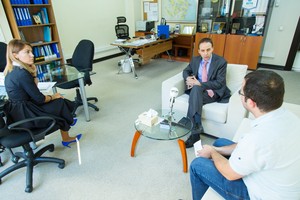
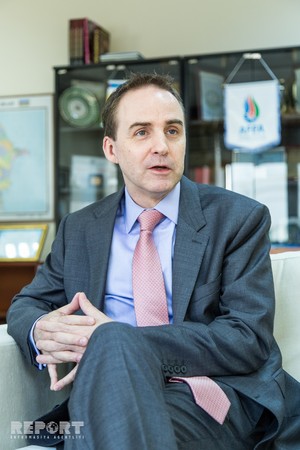
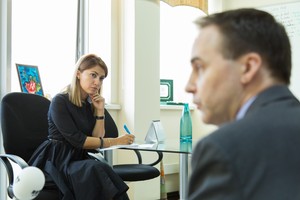
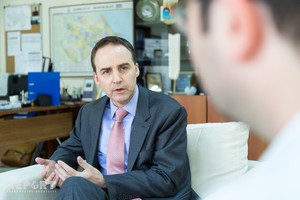
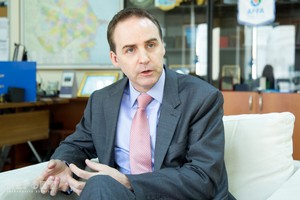


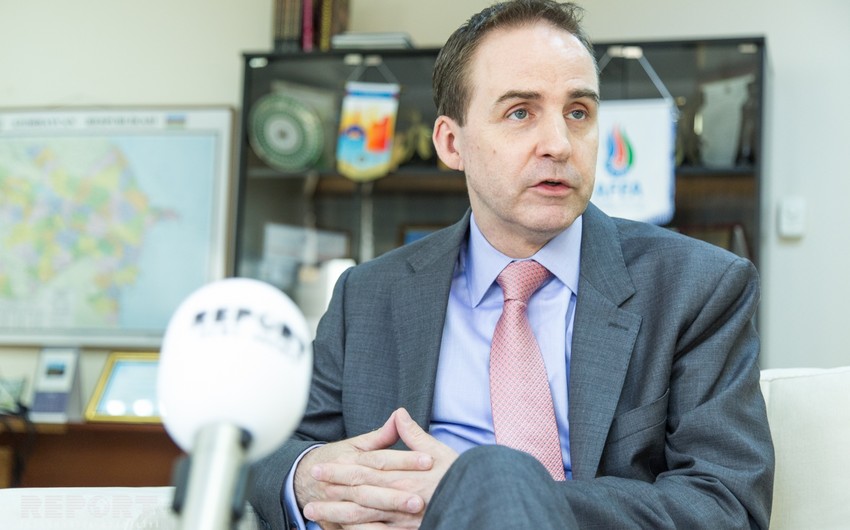 https://images.report.az/photo/f55d9b0d-ea9c-4a44-9abc-a432113d7469.jpg
https://images.report.az/photo/f55d9b0d-ea9c-4a44-9abc-a432113d7469.jpg

